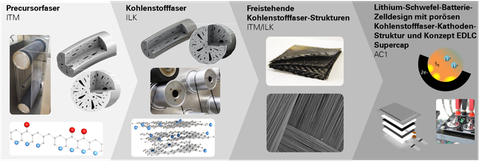Interdisciplinary junior research group named „e-Carbon“
Based on global mega trends, such as the shortage in natural resources and the simultaneously increasing individualisation in lifestyles, the sectors of energy storage and lightweight engineering have become key technologies, for example in the field of innovative mobility concepts. The resource-efficient use of novel, application-specific materials with high functional density is of particular importance for the development of high-tech products in Saxony for which carbon fibres exhibit tremendous potential.
Scientists at the TU Dresden (TUD) have succeeded in creating an interdisciplinary junior research group named „e-Carbon“ (ESF-SAB 100310387), including chemists, textile experts and plastics engineers, which will spend the next three years – starting July 1st 2017 –generating customized and multifunctional carbon fibres for the storage of high energy densities. This promising project was chosen among over 40 applications by the TU Dresden and the Sächsische Aufbaubank SAB-ESF, as it provided the most future-oriented and forward-thinking concept.
This complex topic will be explored by young scientists at the TUD from the Institute of Textile Machinery and High Performance Material Technology (ITM), the Institute for Lightweight Engineering and Polymer Technology (ILK), and the Chair of Inorganic Chemistry I (AC1). Due to the interdisciplinary focus of the consortium, ideal preconditions have been established for intense scientific and industrial networking in innovative fields of research with high practical relevance on regional, national and international levels. Main efforts will be on qualifying and training future experts for the Saxon labour market, spin-offs of start-ups and assuming entrepreneurial responsibility in the high-tech sector.
Professor Chokri Cherif, coordinator of the junior research group and director of the ITM, “The work performed by this young research group will spark further fundamental and application-oriented research in the fields of carbon fibres. We will set new standards for the development of carbon fibres and trigger notable impulses with global impact.”
The required machinery, tools and equipment along the entire process chain are already available and ready for use at the three Institutes of the TU Dresden. In 2016, the Research Center Carbon Fibers Saxony (RCCF) has been founded by the ITM and the ILK in order to pool unique expertises regarding the development, research and production of carbon fibres in Dresden as a major location for lightweight engineering. Thus, there is already a complete stabilisation and carbonisation plant available for “e-Carbon” to develop innovative functionalised carbon fibres.
Not only can stiffness and strength of this new type of carbon fibres be increased significantly, but their structure can also be adjusted specifically to complete further functions. Carbon fibres offer - due to their large internal surface that has not yet been made accessible - an enormous potential for energy storage systems, which will be targeted by the junior scientist group in future. Most significantly, this will be enabled by a trans-scale interconnected pore system, i.e. continuously cross-linked voids of defined sizes within the fibers. A great advantage in terms of energy storage is that the mechanical properties of conventional carbon fibres are not impaired, and active materials as well as carbon fibres act as current collectors.
„The customisation of carbon fibres and the hybridisation of materials on a micro scale will result in considerably higher battery capacities and completely new construction methods for electric mobility from micro to macro scale” says Professor Hubert Jäger from the Institute for Lightweight Engineering and Polymer Technology (ILK). “Customized carbon fibres offer precise material properties, and thus form the foundation for highly stressable and high-energy battery concepts with an enormous lightweight engineering potential. This will be our contribution to the development of innovative systems for electric mobility.”
Among various research foci, energy storage systems based on lithium sulfur batteries with a high energy density are to be investigated, and long-term concepts for the transmission of new discoveries into the fields of flexible dual-layer capacitors with rapid energy storage are to be designed. The results of this junior research group are supposed to ring in the industrial breakthrough in battery technology and electric mobility. Professor Stefan Kaskel points out, “The integration of electric storage elements into building components will open new markets for carbon materials. It is an important step towards the establishment of decentralized energy storage systems.”

Entwicklungskette zur Speicherung elektrischer Energie mit Hilfe funktioneller Kohlenstofffasern

